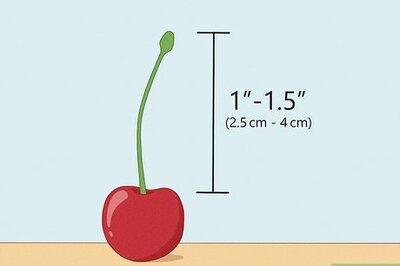
views
New Delhi: Food inflation eased to 10.63 per cent for the week ended November 5 even as prices of agricultural items, barring onions and wheat, continued to rise on an annual basis.
Food inflation, as measured by the Wholesale Price Index (WPI), stood at 11.81 per cent in the previous week ended October 29. The rate of price rise of food items stood at 11.41 per cent in the corresponding week of the previous year.
As per data released by the government on Thursday, onions became cheaper by 22.89 per cent year-on-year, while wheat price were down 3.63 per cent.
However, all other items became more expensive on an annual basis during the week under review.
While vegetables became 27.26 per cent costlier, pulses grew dearer by 14.44 per cent, milk by 10.74 per cent and eggs, meat and fish by 11.73 per cent.
Fruits also became 5.99 per cent more expensive on an annual basis, while cereal prices were up 3.53 per cent.
Inflation in the overall primary articles category stood at 10.39 per cent during the week ended November 5, as against 11.43 per cent in the previous week. Primary articles have over 20 per cent weight in the wholesale price index.
Inflation in non-food articles, including fibres, oilseeds and minerals, was recorded at 5.33 per cent during the week under review, as against 6.41 per cent in the week ended October 29.
Fuel and power inflation stood at 15.49 per cent during the week ended November 5, as compared to 14.50 per cent in the previous week.
The continued rise in food prices is likely to exert further pressure on the government and the Reserve Bank to tackle the situation expeditiously.
Concerned over the inflationary spiral, the government had on Wednesday said it is taking steps to remove supply bottlenecks and expects prices to ease from December.
"We are taking care to remove the supply constraints and I do hope from the month of December, inflation pressure would be moderate," Finance Minister Pranab Mukherjee had said on Wednesday.
Headline inflation, which also factors in manufactured items, has been above the 9 per cent-mark since December, 2010. It stood at 9.73 per cent in September this year.
The RBI has hiked interest rates 13 times since March, 2010, to tame demand and curb inflation.
In its second quarterly review of the monetary policy last month, the apex bank said it expects inflation to remain elevated till December on account of the demand-supply mismatch, before moderating to 7 per cent by March, 2012.
















Comments
0 comment